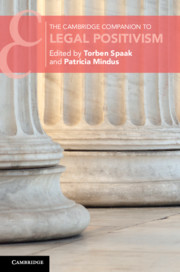Book contents
- The Cambridge Companion to Legal Positivism
- Cambridge Companions to Law
- The Cambridge Companion to Legal Positivism
- Copyright page
- Contents
- Figures
- Contributors
- Acknowledgements
- 1 Introduction
- Part I Fundamentals
- Part II History
- Part III Central Figures
- Part IV Main Tenets
- Part V Normativity and Values
- Part VI Critique
- 27 Gustav Radbruch’s Critique of Legal Positivism
- 28 Good Order and Workable Arrangements: Lon Fuller’s Critique of Legal Positivism
- 29 Dworkin’s Critique of Hart’s Positivism
- 30 Tracing Finnis’s Criticism of Hart’s Internal Point of View: Instability and the ‘Point’ of Human Action in Law
- 31 Alexy’s Critique of Legal Positivism
- 32 Mark Greenberg on Legal Positivism
- 33 Positivism and Totalitarianism
- Index
- References
28 - Good Order and Workable Arrangements: Lon Fuller’s Critique of Legal Positivism
from Part VI - Critique
Published online by Cambridge University Press: 21 January 2021
- The Cambridge Companion to Legal Positivism
- Cambridge Companions to Law
- The Cambridge Companion to Legal Positivism
- Copyright page
- Contents
- Figures
- Contributors
- Acknowledgements
- 1 Introduction
- Part I Fundamentals
- Part II History
- Part III Central Figures
- Part IV Main Tenets
- Part V Normativity and Values
- Part VI Critique
- 27 Gustav Radbruch’s Critique of Legal Positivism
- 28 Good Order and Workable Arrangements: Lon Fuller’s Critique of Legal Positivism
- 29 Dworkin’s Critique of Hart’s Positivism
- 30 Tracing Finnis’s Criticism of Hart’s Internal Point of View: Instability and the ‘Point’ of Human Action in Law
- 31 Alexy’s Critique of Legal Positivism
- 32 Mark Greenberg on Legal Positivism
- 33 Positivism and Totalitarianism
- Index
- References
Summary
Winston argues that Lon Fuller’s critique of legal positivism was rather special in focusing on issues that lay beneath the surface of the usual intramural disputes, and thus related only indirectly to what positivists, such as Kelsen and Hart, said explicitly when expounding their views. Winston explains that, as a pragmatist, Fuller largely eschewed conceptual or semantic questions, focusing instead on questions of methodology and governance, in particular the adequacy of a scientific approach to understanding human society and the role played by agency and purpose in ordering civic life. In a phrase, Fuller faulted legal positivists for encouraging the kind of social engineering perspective reflected in bureaucratic/regulatory states. The importance of a pragmatic jurisprudence – and its superiority over other social sciences – lies precisely in the practical experience and concerns which lawyers possess (and other social scientists lack) and which they bring to bear in fashioning the participatory social architecture that is better at protecting human freedom.
- Type
- Chapter
- Information
- The Cambridge Companion to Legal Positivism , pp. 651 - 674Publisher: Cambridge University PressPrint publication year: 2021

